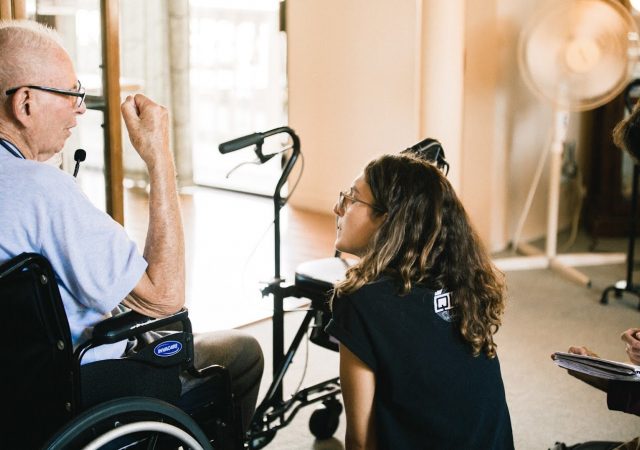One Engineer’s Unexpected Turn to Entrepreneurship | De Oro Devices

Sidney Collin never saw herself as an entrepreneur. The biomedical engineering graduate hardly expected to start a business and even when she innovated a device for Parkinson’s patients, she simply saw that as another facet of research.
That is until she got involved in CIE programming.
“I have a very engineering-based mind and don’t think like a businessperson,” explained Collin. “I jumped into entrepreneurship without planning to at all, but I got exposed to this whole other world that I didn’t know existed, that I didn’t know I wanted to be a part of or even felt like I would fit into.”
While working on a Cal Poly engineering project, Collin was introduced to local veteran Jack Brill who was dealing with freezing of gait, a Parkinson’s symptom that hinders movement.
Knowing about extensive research backing audio and visual cues as a way to combat this, Collin created what is now the NextStride, a medical device under her company De Oro Devices that uses lasers and metronomes to prevent freezing of gait.
After Brill found it successful, he sparked demand for it in a local Parkinson’s support group.
“It was completely unfathomable to me that something so simple and so well known to be effective didn’t exist already,” Collin said. “I realized that there was a much bigger need for a device like this.”
The closest thing to a solution then involved a physical therapist laying painter’s tape on a patient’s home floor as a pathway for them to walk along.
“But that confined them to those specific lines,” she said. “We’re allowing them to not only be able to wake up in the middle of the night and go to the bathroom by themselves, but also go to the beach or walk around the block. They can take the cues anywhere.”
To serve the larger community seeking this relief, Collin and her advisor needed funding, so they looked into CIE’s Innovation Quest (IQ). Feeling uncertain about pitching her company, she passed it up in 2017, but got involved the following year.
Her device was immediately met with excitement by CIE leaders, inspiring her to gain business skills in the on-campus Hatchery before officially pitching to investors. Ultimately, De Oro Devices didn’t win — but Collin wasn’t shaken.
Instead, she was pushed to apply for the HotHouse Accelerator and got in.
“I came into that thinking there was no way I could be successful because I didn’t fit the entrepreneurial mold,” Collin recalled about her startup journey’s beginning. “But the CIE offers an incredible amount of support and allows students and super early-stage companies to dream big which is so valuable.”
And that value shows. Collin and co-founder Will Thompson went on to take De Oro Devices through the HotHouse Incubator, launch their medical device on a remarkable timeline, win the Central Coast Angel Conference and secure multiple rounds of investments.
Now post-incubator, the startup remains based in San Luis Obispo as it expands its already-global reach, grows into new disease states and builds out its product line.
“We’re continuously motivated by our customers’ responses saying, ‘I’ve been able to walk for the first time in years, this is amazing, thank you,” Collin said. “It’s crazy to think that there’s no chance I would’ve pursued anything if it wasn’t for the CIE pushing me to realize that there was a business opportunity here and that I could be the one to do it.”